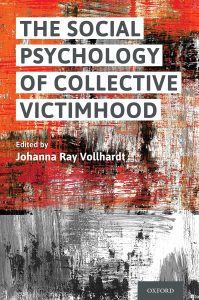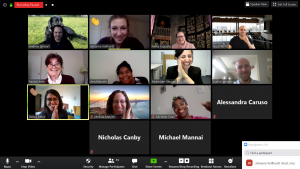 The edited volume, “The Social Psychology of Collective Victimhood”, is now published with Oxford University Press. For a table of contents and more information on the book see here.
The edited volume, “The Social Psychology of Collective Victimhood”, is now published with Oxford University Press. For a table of contents and more information on the book see here.
Mukadder Okuyan defends her dissertation!
On May 11, 2020, Mukadder Okuyan successfully defended her dissertation, titled: “Reacting to a Changing World: A Social Psychological Analysis of Perceived Discrimination among Advantaged Groups.” Due to the pandemic the defense took place via zoom. Congratulations, Dr. Okuyan!

New article published: Resistance to collective victimization and oppression
In this review article, co-authored with Mukadder Okuyan and Helin Ünal and now published in Current Opinion in Psychology, we argue for the need to expand social psychological research on resistance in contexts of collective violence and repression – by considering the wide range of resistance strategies people engage in instead of focusing more narrowly on collective action. Theoretical models of resistance should also the specific nature of the context, such as violence and repression, shapes collective resistance. Read the article abstract here.
New article published: Reconciliation Versus Justice? It Depends on the Context: The Role of Symmetric and Asymmetric Violence in Predicting Postconflict Attitudes
In this article, led by Sandra Penić and now published in Social Psychological and Personality Science, we show with two different nationally representative surveys from the former Yugoslavia, and analyses of geo-coded data on violent conflict events, that the relationship between attitudes towards justice and reconciliation depends on the context: In communities more exposed to events of asymmetric violence, support for justice was linked to rejecting reconciliation. Conversely, in communities more exposed to symmetric violence, justice and reconciliation were perceived as compatible. The abstract is available here.
UN Roundtable on Remembrance and Education in the Aftermath of Genocide
On December 9, 2019, Johanna Ray Vollhardt participated in a roundtable discussion organized by the Permanent Mission of Armenia to the United Nations at the UN Headquarters in New York, entitled “Remembrance and Education as Powerful Tools for Prevention: Drawing Lessons to Address Challenges.” Her comments focused on the importance of acknowledgment in the aftermath of genocide, and the role of education in acknowledgment versus denial. This event was dedicated to the International Day of Commemoration and Dignity of the Victims of the Crime of Genocide and of the Prevention of this Crime. For more information see here.
Psychology Today Blog: Making Sense of Collective Violence and Oppression
Starting this month, I will blog for Psychology Today about topics related to the social psychology of collective violence and oppression, mostly from the perspective of those who are targeted based on their group membership. You can follow the blog here. The first blog post, sparked by the U.S. House recognition of the Armenian Genocide, is titled “Acknowledging Collective Victimization” and can be found here. I welcome suggestions for topics you would find interesting to read about on this blog.
New article published: Through the lens of history: The effects of beliefs about historical victimization on responses to refugees
In this article, led by Zsolt Szabo from ELTE University in Hungary and now published in the International Journal of Intercultural Relations, we examine the relationship between perceptions of historical suffering of Hungarians (in general, and specifically in the 1956 refugee crisis) and attitudes towards refugees coming to Hungary today. The abstract of the article is available here.
Hu Young Jeong receives small grant from Div. 48
This summer, Hu Young Jeong received a small grant from Div. 48: Society for the Study of Peace, Conflict, and Violence to fund a new research project using Q-Methodology to study the complexity of collective victim beliefs in different groups and societies, including South Korea and Hungary. We will be collaborating with Christopher Cohrs and Zsolt Szabo on this project. Congratulations, Hu Young!
Helin Ünal joins our research group
We are pleased to welcome Helin Ünal, who is starting the Social Psychology doctoral program at Clark and joining our research group this year. Helin has a BA from UMass Amherst and an MA from Queens University Belfast and will be working on diaspora groups’ identity, collective victim beliefs, and conflict attitudes. Welcome, Helin!
Dr. Rashmi Nair accepts a tenure-track position at Ashoka University
Rashmi just accepted a tenure track position as Assistant Professor in the Psychology Department at Ashoka University in India, where she has been for the past year as a Visiting Assistant Professor. Congratulations, Rashmi! More information about Ashoka University can be found here: https://www.ashoka.edu.in/page/phd-psychology-206
